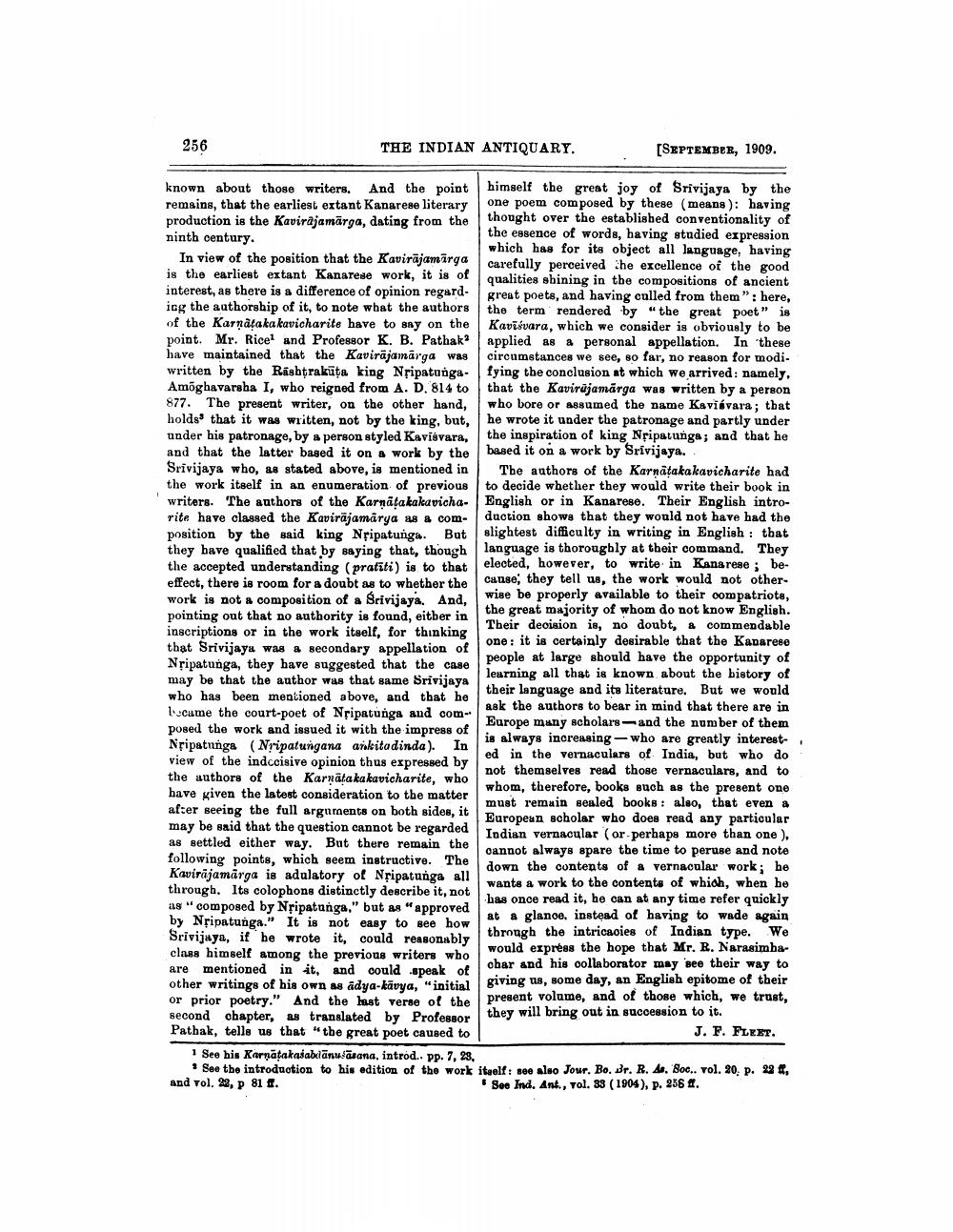________________
256
THE INDIAN ANTIQUARY.
[SEPTEMBER, 1909.
known about those writers. And the point himself the great joy of Srivijaya by the remains, that the earliest extant Kanarese literary one poem composed by these (means): having production is the Kavirajamärga, dating from the
thought over the established conventionality of ninth century.
the essence of words, having studied expression
which has for its object all language, having In view of the position that the Kavirajamärga
carefully perceived the excellence of the good is the earliest extant Kanarese work, it is of
qualities shining in the compositions of ancient interest, as there is a difference of opinion regard. great poets, and having culled from them": here, icg the authorship of it, to note what the authors the term rendered by "the great poet" is of the Karnataka kavicharite have to say on the Kavišvara, which we consider is obviously to be point. Mr. Ricel and Professor K. B. Pathak | applied as a personal appellation. In these have maintained that the Kavirajamarga was circumstances we see, so far, no reason for modi. written by the Rashtrakūta king Nřipatunga- fying the conclusion at which we arrived: namely, Amõghavarsha I, who reigned from A. D. 814 to that the Kavirūjamarga was written by a person 877. The present writer, on the other hand, who bore or assumed the name Kavisvara; that holds' that it was written, not by the king, but, he wrote it under the patronage and partly under under his patronage, by a person styled Kavisvara,
the inspiration of king Nripatunga; and that he and that the latter based it on & work by the based it on a work by Srivijaya. Srivijaya who, as stated above, is mentioned in The authors of the Karnatakakavicharite had the work itself in an enumeration of previous to decide whether they would write their book in writers. The authors of the Karnatakakavicha- English or in Kanarese. Their English introrite have classed the Kavirajamarya as a com- duction shows that they would not have had the position by the said king Nřipatunga. But slightest difficulty in writing in English: tbat they have qualified that by saying that, though language is thoroughly at their command. They the accented underutanding i vratiti in to that. I elected, however, to write in Kanarese beeffect, there is room for a doubt as to whether the case, they tell us, the work would not otherwork is not a composition of a Srivijaya. And,
mposition of Srivijay And wise be properly available to their compatriots, pointing out that no authority is found, either in
the great majority of whom do not know English.
Their decision is, no doubt, & commendable inscriptions or in the work itself, for thinking
one: it is certainly desirable that the Kadarese that Srivijaya was a secondary appellation of
people at large should have the opportunity of Nripatunga, they have suggested that the case
learning all that is known about the bistory of may be that the author was that same Srivijaya
their language and its literature. But we would who has been mentioned above, and that he
ask the authors to bear in mind that there are in bucame the court-poet of Nipatunga and composed the work and issued it with the impress of
Europe many scholars and the number of them Nripatunga (Nripatungana ankitadinda). In
is always increasing - who are greatly interest view of the indccisive opinion thus expressed by
ed in the vernaculars of India, but who do the authors of the Karnataka kavicharite, who
not themselves read those vernaculars, and to have given the latest consideration to the matter
whom, therefore, books such as the present one
must remain sealed books : also, that even & after seeing the full arguments on both sides, it
European scholar who does read any particular may be said that the question cannot be regarded
Indian vernacular (or perhaps more than one ), as settled either way. But there remain the
cannot always spare the time to peruse and note following points, which seem instructive. The
down the contents of a vernacular work; he Kavirajamarga is adulatory of Nripatunga all
wants a work to the contents of which, when he through. Its colophons distinctly describe it, not
has once read it, he can at any time refer quickly 118 "composed by Nripatunga." but as "approved by Npipatunga." It is not easy to see how
at a glanoe, instead of having to wade again Srivijaya, if he wrote it, could reasonably
through the intricacies of Indian type. We class himself among the previous writers who
would express the hope that Mr. R. Narasimhaare mentioned in it, and could speak of
char and his collaborator may see their way to other writings of his own as adya-kavya, "initial
giving us, some day, an English epitome of their or prior poetry." And the last verse of the
present volume, and of those which, we trust, second chapter, as translated by Professor
they will bring out in succession to it. Pathak, tells us that "the great poet caused to
J. F. FLEET. 1 See his Karnatakasabilānu sana, introd.. pp. 7, 28,
See the introduction to his edition of the work itself: see also Jour. Bo, Dr. R. 46. Soc.. vol. 20. P. 22 4, and vol. 22, p 81 ff.
See Ind. Ant., vol. 88 (1904), p. 256 #.




